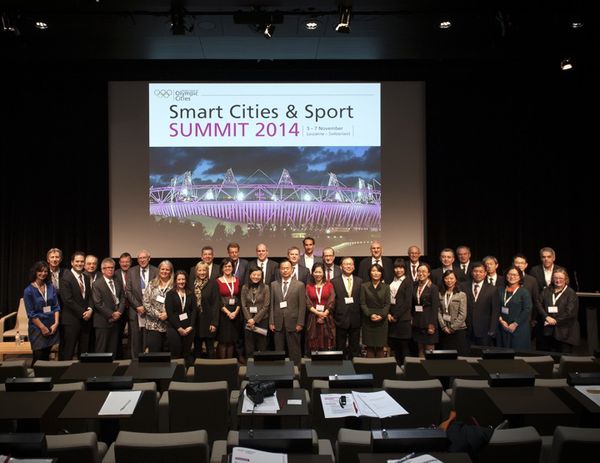On top of the world

Members of the Smart Cities & Sport Summit, hosted by the World Union of Olympic Cities, pose for a photo at the Olympic Museum in Lausanne, Switzerland. The summit was held Nov. 5-7. Lake Placid Mayor Craig Randall (seventh from left) and Regional Office of Sustainable Tourism President Jim McKenna (seventh from right) were the only ones from Lake Placid to participate in this year’s meeting. (Photo provided)
LAKE PLACID – Village of Lake Placid Mayor Craig Randall and Regional Office of Sustainable Tourism President Jim McKenna recently spent several days in Europe attending the annual World Union of Olympic Cities meeting in Lausanne, Switzerland, the Olympic capital of the world.
Lausanne is the home of the International Olympic Committee and the Olympic Museum, where the World Union held its Smart Cities & Sports Summit Nov. 5-7. The venue immediately made Randall and McKenna feel at home.
“We were in the Olympic Museum, and there was Lake Placid stuff around,” McKenna said.
“We opened one door and walked in, and here’s a USA hockey shirt,” Randall added. “It’s right there. You can’t miss it when you walk through the door. It’s a fabulous feeling.”
Randall is also a member of the World Union of Olympic Cities Executive Committee, which met Nov. 4 at the Hotel D’Angleterre. The Union is represented by 23 active members and five associate members. Lake Placid is the only U.S. winter city on the active member list, which includes Los Angeles, Atlanta and St. Louis. The winter cities of Denver and Reno/Tahoe are associate members.
The summit gave Randall and McKenna another chance to share information and resources with other host cities from around the world. World Union members, non-member city officials and IOC officials attended the summit.
“This summit is a tremendous opportunity for Lake Placid to be part of top-end conversations with other host city representatives,” Randall said. “The IOC points to Lake Placid as a long-standing example of the games being an appropriate mechanism to meet community development goals.”
The summit also gave the Lake Placid contingent the opportunity to explain Lake Placid’s legacy in the Olympic movement, specifically by showing world leaders how the venues are still being used as an economic engine and how the Olympic heritage has attracted non-summer events to the village, such as the Ironman Lake Placid triathlon.
“Overall, the Olympic Winter Games have represented a vehicle for community redevelopment in Lake Placid,” McKenna said. “In the 1920s, the games were a mechanism for redevelopment for the 1932 games, even in a time of national financial depression. Twice in the last 81 years the games have allowed Lake Placid to achieve the community’s goals to promote a healthy lifestyle, and to establish Lake Placid as a world-class sports center and resort.”
Lake Placid has been an active member of the World Union for seven years, and Randall and McKenna said they expect the village to continue its participation in the organization.
The 2014 summit featured a number of presentations from host cities. McKenna’s Lake Placid slide show on Nov. 5 was included in a panel discussion titled “Hosting the Olympic Games – short-, medium- and long-term impact.” Other members of the panel were Gilbert Felli, senior Olympic games advisor for the International Olympic Committee; Simon Cooper, head of sport for the Greater London Authority; and Maite Fandos, deputy mayor for quality of life, equality and sports in Barcelona. Their job was to explain the after-effects of the Olympics on their cities.
McKenna told the group that Lake Placid has been a winter destination since the winter of 1904-1905, when the Lake Placid Club opened its doors to members for the first time for winter recreation. And, thanks to the Winter Olympics in 1932 and 1980, he said the village continues to grow as a winter and summer tourist destination.
“I was able to present to this gathering of host cities from all over the world how the Olympic Winter Games continue to provide us with the opportunity to further strengthen Lake Placid’s presence in the international sports marketplace, and to encourage other host cities to utilize the games in the same way as they have influenced the ongoing vitality of Lake Placid, Adirondacks USA,” McKenna said.
ROOST’s tourism research shows that while 78 percent of visitors come to Lake Placid for outdoor recreation, 52 percent of them travel here because of the village’s Olympic heritage. That’s the Olympic legacy in Lake Placid.
“It’s part of Lake Placid’s DNA. There’s no doubt about it,” McKenna said.






